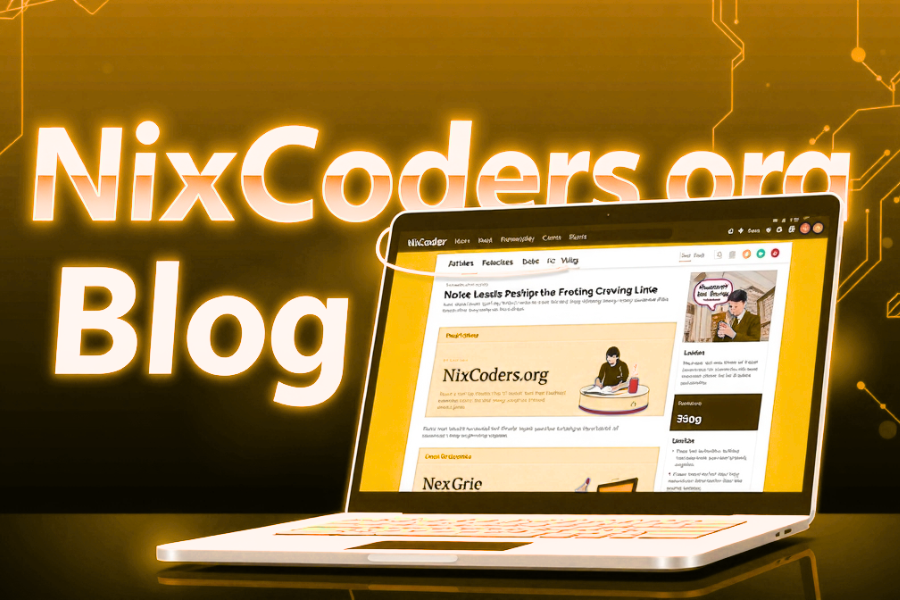If you’re ready to start NixCoders.org Blog, you’re on the right path to building a platform that showcases your tech skills, strengthens your personal brand, and connects you with a global developer community. Whether you’re planning to write coding tutorials, share DevOps best practices, or reflect on your open-source journey, a well-structured blog gives you credibility and reach.
This guide covers everything you need to launch your blog — from technical setup to content planning and promotion. By the end, you’ll know exactly how to create a blog that not only looks professional but also attracts readers and grows over time.
Why Start a Blog on NixCoders.org?
Before diving into the technical steps, let’s look at why blogging on NixCoders.org is a great idea:
- Memorable domain name: The word Nix connects naturally to Linux and system-level programming, while Coders appeals to developers. It’s short, sharp, and professional.
- Personal brand growth: Publishing tutorials and insights helps you build authority in your niche. Over time, readers will recognize you as a reliable source of knowledge.
- Community building: A blog attracts like-minded developers who share your interests. This can lead to collaborations, open-source contributions, or even job opportunities.
- Career opportunities: A strong blog can open doors to freelancing, consulting, speaking gigs, or even book deals.
- Helping others: Perhaps the most satisfying reason — you can give back to the community by simplifying complex topics and making learning accessible.
NixCoders.org has the potential to become a go-to hub for coding resources, tutorials, and developer tips.
Step-by-Step Guide to Starting the Blog
1. Register Your Domain
If you haven’t already, secure nixcoders.org through a trusted registrar such as Namecheap or GoDaddy. Since .org is widely recognized for communities and educational platforms, it reinforces credibility.
2. Choose a Hosting Provider
Pick a hosting plan that fits your budget and technical comfort. Some good options are:
- SiteGround – Reliable, fast, with excellent support.
- Hostinger – Affordable plans, great for beginners.
- Bluehost – Easy integration with WordPress.
If you’re more advanced, you could also try VPS hosting (DigitalOcean, Linode, or Vultr) for greater control.
3. Install a CMS (Content Management System)
A CMS is the backbone of your blog. Options include:
- WordPress – Beginner-friendly, customizable, with thousands of themes and plugins.
- Ghost – Lightweight, designed for writing-focused blogs.
- Hugo or Jekyll – Static site generators ideal for developers who enjoy Git-based workflows.
For most beginners, WordPress is the easiest choice because it allows quick setup and supports SEO plugins.
4. Set Up Basic Pages
Your blog should have at least these pages:
- About – Tell visitors who you are, your background, and what your blog offers.
- Contact – Provide a simple form or email for communication.
- Blog – The main hub for your posts.
Optional: Resources or Portfolio pages to showcase your projects.
5. Publish Your First Post
Start with a welcome post introducing your blog’s mission. Share your story, what readers can expect, and why you’re excited to share knowledge. This sets the tone for future content.
Choosing a Niche and Blog Style
A successful blog focuses on a specific niche. For NixCoders.org, strong options include:
- Coding tutorials (Python, JavaScript, Rust, Go)
- Linux & system administration tips
- DevOps and CI/CD pipelines
- Cloud computing (AWS, Azure, GCP guides)
- Open-source projects (contribution guides, project highlights)
Blog Styles to Consider:
- Tutorial-based: Step-by-step coding guides with snippets.
- Project-driven: Breakdown of real coding projects.
- Personal journey: Share your growth through challenges and learning.
- Industry commentary: Reviews of tools, frameworks, or trends.
Pick a style you enjoy — consistency matters more than variety when building an audience.
Content Strategy for NixCoders.org Blog
Without a clear strategy, even great blogs fail to grow. Here’s how to stay on track:
1. Do Keyword Research
Use tools like Ahrefs, SEMrush, or Ubersuggest to find topics people search for. For example:
- “Docker for beginners”
- “Best VS Code extensions 2025”
- “Deploy apps to AWS step by step”
2. Plan a Content Calendar
Commit to posting once a week or every two weeks. Consistency builds trust.
3. Mix Content Types
- How-to guides: Actionable tutorials
- Listicles: “Top 10…” style articles
- Opinion posts: Share insights on industry shifts
- Project write-ups: Document how you built something
Example Topics:
- “Getting Started with Docker in 2025”
- “Top 10 Python Tricks Every Developer Should Know”
- “How to Deploy Your First App on Heroku”
Technical Setup and Design
A clean, user-friendly design makes your blog stand out.
- Responsive theme: Choose light themes like Astra, GeneratePress, or Neve.
- Mobile optimization: Ensure your site looks great on smartphones.
- Fast performance: Use caching, image compression, and a CDN.
- Simple navigation: Don’t overwhelm visitors with too many menu options.
- Accessibility: Add alt text to images, use high-contrast colors, and readable fonts.
Pro tip: First impressions matter — a fast, clean blog makes visitors stay longer.
Essential Plugins and Tools
For WordPress, here are must-have tools:
- Rank Math or Yoast SEO – Optimize your posts for search engines.
- Google Site Kit – Track analytics and performance.
- WP Rocket or W3 Total Cache – Improve site speed.
- Akismet – Protect against spam comments.
- UpdraftPlus – Backup your blog regularly.
If using Hugo/Jekyll, integrate GitHub Actions for automated builds and deploys.
SEO Optimization Tips
SEO is critical for traffic growth. Follow these best practices:
- Use title tags and meta descriptions with relevant keywords.
- Structure posts with H1, H2, H3 headings.
- Add internal links to keep readers on your site.
- Compress and optimize images.
- Add schema markup to help search engines understand your content.
Over time, consistent SEO builds steady organic traffic.
Monetization Options
Once your blog gains readers, you can turn it into a revenue stream:
- Affiliate marketing: Promote coding tools, hosting platforms, or courses.
- Ads: Use Google AdSense for small traffic, Mediavine once you grow.
- Digital products: Sell eBooks, coding templates, or mini-courses.
- Memberships/Patreon: Offer premium guides or video tutorials.
Always focus on value first, monetization later. Loyal readers are more likely to support your blog.
Promotion and Audience Growth
Content without promotion goes unnoticed. Try these strategies:
- Developer platforms: Share on Dev.to, Hashnode, and GitHub.
- Social media: Post updates on Twitter, LinkedIn, and Mastodon.
- Email newsletter: Use MailerLite or ConvertKit to build a subscriber list.
- Tech communities: Engage in Reddit communities like r/webdev or r/programming.
- Networking: Comment on other blogs, join coding forums, and cross-promote.
Consistency in promotion equals steady growth.
Common Mistakes to Avoid
Many beginner bloggers stumble because of avoidable errors:
- Ignoring SEO – Great content won’t rank without optimization.
- Overloading plugins – Too many plugins slow down your site.
- Inconsistent posting – Gaps reduce credibility.
- Skipping analytics – Without data, you can’t improve.
- Not backing up – Risk losing everything during errors or hacks.
Stay disciplined and make small, data-driven improvements.
Final Thoughts
Starting NixCoders.org Blog is both exciting and rewarding. With the right tools, a clear niche, and consistent effort, you can build a blog that becomes a trusted resource for developers worldwide.
Here’s the winning formula:
- Pick a niche you’re passionate about.
- Use WordPress (or a developer-friendly CMS) for easy setup.
- Publish consistently and focus on quality.
- Optimize for SEO and speed.
- Promote your content to the right communities.
Blogging is a long-term game. Success doesn’t come overnight, but with persistence, NixCoders.org can grow into a valuable hub for coding knowledge and community building.




